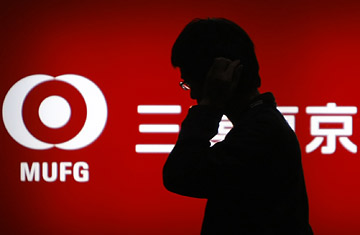
A man walks past a signboard of Mitsubishi UFJ bank at its branch in Tokyo.Mitsubishi UFJ Financial Group, Japan's biggest bank, said on Monday it will raise up to $10.6 billion by issuing new shares, the latest sign that a free-falling stock market is likely to shred profits at Japanese lenders.
Exactly two weeks after Mitsubishi UFJ Financial Group, Japan's top lender, tossed a $9-billion lifeline to Morgan Stanley — in exchange for a 21% stake — Mitsubishi UFJ is in need of some help itself. On Monday, Japan's largest bank said that it needs to raise $10.7 billion in capital and will be selling common and preferred shares. It was negative news following negative news. Less than one week ago, Mitsubishi UFJ downgraded its net profit for the first half of the year to about half of what it was last year at this time. Japan's Nikkei index closed at its lowest level in 26 years.
Shares of Japan's top three mega-banks — so recently perceived as impervious to the subprime-sparked crisis — tumbled along with it, in what is now the biggest decline in bank shares in 21 years and the latest sign that the global economic crisis is spreading further into Japan's financial system. Mitsubishi UFJ and Mizuho Financial Group, Japan's second largest bank, led the fall with shares dropping 15%, followed by an 11% drop in the shares of Sumitomo Mitsui Financial Group, Japan's third-largest lender.
News that Japan's three biggest financial institutions — which have all recently invested in foreign financial institutions — were considering selling new shares to shore up their [working capital] triggered the decline. The move would dilute banks' earnings per-share, compounding investor worry that the appreciation of the yen will further reduce share value and corporate profits. Mitsubishi UFJ, like Japan's other mega-banks, avoided damage caused by the subprime crisis, but its stock portfolio is now taking a hit as the Nikkei and Tokyo Stock Price Index (Topix) continue to fall and wipe value from its balance sheet. One credit analyst estimates that since the end of June, the total stock value held by the top three banks has dropped by $56 billion, signaling that other banks are clearly at risk.
"Equity market declines are having a negative impact on the capital adequacy ratio of major banks," says Shinichi Ina, bank analyst at Credit Suisse Japan. "It will get worse in the short term because the other sectors are in severe situations, making it difficult for banks as lending amounts shrink and credit costs increase." But the new offerings have their risk. Large public shareholdings made banks vulnerable to market fluctuations during Japan's lost decade — after the real-estate and banking bubble burst in the 1990s — and the government intervened to buy shares to prevent further bank losses.
Japan's banks have worked to reduce their shareholdings, but economists and bank analysts have mixed views on just how much exposure banks now have to stock price movement. Hironari Nozaki, a bank analyst at Nikko Citigroup, says that mega-banks should be stable even if the Topix plummets to 600 or the Nikkei 5,500. (they closed Monday at 746 and 7,162 respectively). "But," he says, "I don't want to imagine that situation."
Indeed, there is a sense of deja vu in the proposals of the government and regulators to stabilize the financial system. On Monday, Prime Minister Taro Aso called for a drafting of emergency measures, such as purchasing stocks held by banks, limiting the short selling of stocks and increasing the amount of taxpayer money to be injected into banks from 2 trillion yen to 10 trillion yen — all reminiscent of Japan's 1990s meltdown. The government action appears to be focused on preempting losses caused by share prices. Declared Aso, "Stock prices greatly influence the real economy."
There may be negative consequences, however, to this new round of intervention. As part of finalizing the details of the government's second stimulus package, Aso is also calling for changes to accounting rules, including a relaxation of capital adequacy requirements for banks and a suspension of the golden accounting rule of mark-to-market. Credit Suisse's Ina warns that fiddling with mark-to-market accounting (in which a bank's assets are assessed at market value) could have an affect on banks' financial earnings by "obscuring the realities." He warns that changing the current standard might "provide more room to manipulate earnings sometime in the future" and could "allow bankers to hide big unrealized losses on their bond portfolios." But Tokyo apparently wants to put out its major conflagration now and worry about the potential brushfires later.
